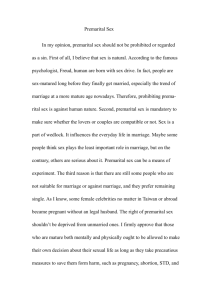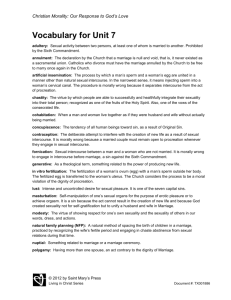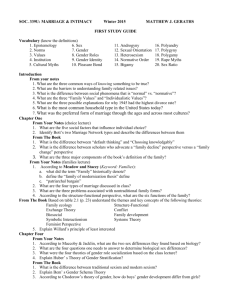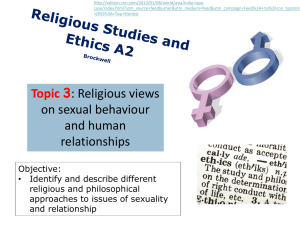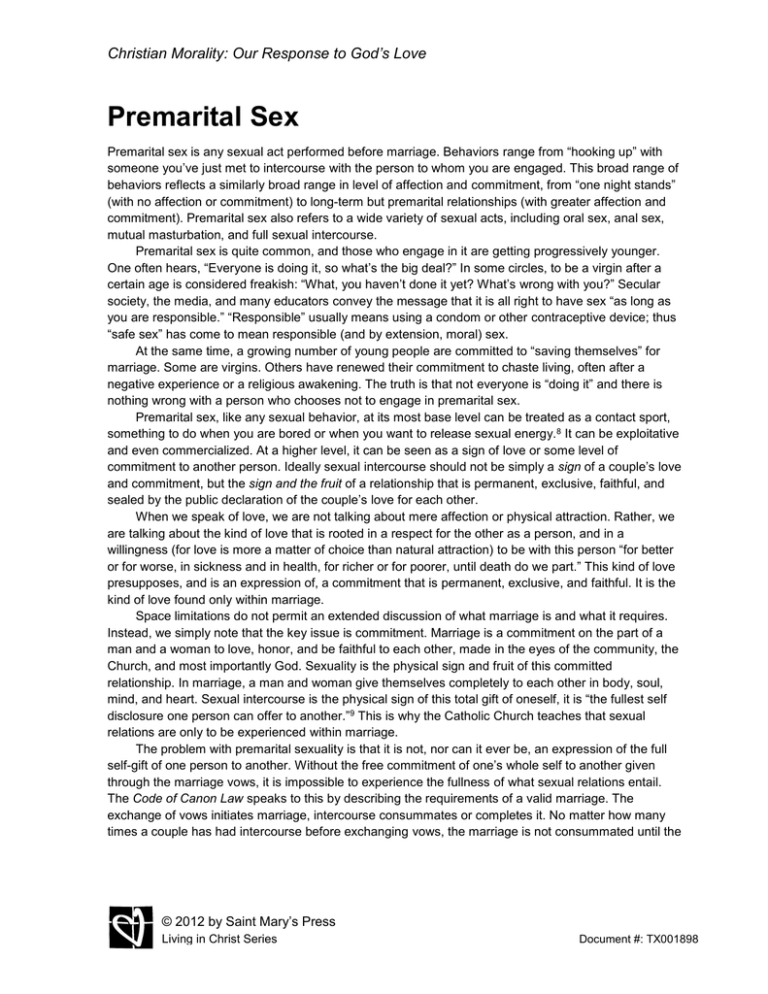
Christian Morality: Our Response to God’s Love
Premarital Sex
Premarital sex is any sexual act performed before marriage. Behaviors range from “hooking up” with
someone you’ve just met to intercourse with the person to whom you are engaged. This broad range of
behaviors reflects a similarly broad range in level of affection and commitment, from “one night stands”
(with no affection or commitment) to long-term but premarital relationships (with greater affection and
commitment). Premarital sex also refers to a wide variety of sexual acts, including oral sex, anal sex,
mutual masturbation, and full sexual intercourse.
Premarital sex is quite common, and those who engage in it are getting progressively younger.
One often hears, “Everyone is doing it, so what’s the big deal?” In some circles, to be a virgin after a
certain age is considered freakish: “What, you haven’t done it yet? What’s wrong with you?” Secular
society, the media, and many educators convey the message that it is all right to have sex “as long as
you are responsible.” “Responsible” usually means using a condom or other contraceptive device; thus
“safe sex” has come to mean responsible (and by extension, moral) sex.
At the same time, a growing number of young people are committed to “saving themselves” for
marriage. Some are virgins. Others have renewed their commitment to chaste living, often after a
negative experience or a religious awakening. The truth is that not everyone is “doing it” and there is
nothing wrong with a person who chooses not to engage in premarital sex.
Premarital sex, like any sexual behavior, at its most base level can be treated as a contact sport,
something to do when you are bored or when you want to release sexual energy.8 It can be exploitative
and even commercialized. At a higher level, it can be seen as a sign of love or some level of
commitment to another person. Ideally sexual intercourse should not be simply a sign of a couple’s love
and commitment, but the sign and the fruit of a relationship that is permanent, exclusive, faithful, and
sealed by the public declaration of the couple’s love for each other.
When we speak of love, we are not talking about mere affection or physical attraction. Rather, we
are talking about the kind of love that is rooted in a respect for the other as a person, and in a
willingness (for love is more a matter of choice than natural attraction) to be with this person “for better
or for worse, in sickness and in health, for richer or for poorer, until death do we part.” This kind of love
presupposes, and is an expression of, a commitment that is permanent, exclusive, and faithful. It is the
kind of love found only within marriage.
Space limitations do not permit an extended discussion of what marriage is and what it requires.
Instead, we simply note that the key issue is commitment. Marriage is a commitment on the part of a
man and a woman to love, honor, and be faithful to each other, made in the eyes of the community, the
Church, and most importantly God. Sexuality is the physical sign and fruit of this committed
relationship. In marriage, a man and woman give themselves completely to each other in body, soul,
mind, and heart. Sexual intercourse is the physical sign of this total gift of oneself, it is “the fullest self
disclosure one person can offer to another.”9 This is why the Catholic Church teaches that sexual
relations are only to be experienced within marriage.
The problem with premarital sexuality is that it is not, nor can it ever be, an expression of the full
self-gift of one person to another. Without the free commitment of one’s whole self to another given
through the marriage vows, it is impossible to experience the fullness of what sexual relations entail.
The Code of Canon Law speaks to this by describing the requirements of a valid marriage. The
exchange of vows initiates marriage, intercourse consummates or completes it. No matter how many
times a couple has had intercourse before exchanging vows, the marriage is not consummated until the
© 2012 by Saint Mary’s Press
Living in Christ Series
Document #: TX001898
Premarital Sex
Page | 2
couple’s first act of intercourse after the vows have been exchanged. The reason for this is simple: one
cannot complete what has not been initiated.10
Because it does not embody the commitment, permanency, exclusivity, and faithfulness inherent
in marriage, premarital sex brings with it a host of serious risks. There are physical risks, including
pregnancy, HIV/AIDS, and other sexually transmitted diseases. There are emotional risks, too, for
intercourse is not simply a matter of commingling flesh; it is the full giving of one’s self to another with
all the physical, emotional and psychological vulnerabilities this entails.11 In this sense, premarital sex is
always in some way flawed. It always involves some lack of love, some inability or unwillingness to give
oneself away in love, or some refusal to commit oneself permanently to another person. This deficiency
of love makes it impossible for sexual intercourse to embody the meaning that it was meant to have by
God’s design. To underscore this point, listen to the words of former students speaking about their own
sexual experiences: I know that society and the media had a lot to do with my sexual decisions.
Everyone was doing it so it was ok for me to do it. I was doing it even though I did not want to do it. I
guess I thought I was missing out because sex was everywhere I turned. Emotionally I felt empty when
I engaged in premarital sex. I never committed myself to the person I was with, even when we were in a
“committed” relationship. I always knew I could just leave. I gave my body, but never my mind and soul.
I could not see myself having kids with some of my partners, and there were some whom I could not
even introduce to my parents. If I can’t introduce someone to my family and friends, why was I having
sex with him? Overall, saving yourself until marriage is a good idea.
Whatever the level of affection or commitment that a couple may have, one is not capacitated to
engage in sexual intercourse outside of marriage. What does this mean? No one denies that most
individuals are capable of performing a sexual act on the biological level, but biology does not qualify or
otherwise capacitate a person to engage in intercourse. Consider the following analogy. Suppose that
on the day before his ordination to the priesthood, Rev. Guevin decided to hear confessions. He may
be physically able to hear them and physically capable of saying the words of absolution, but these
features do not qualify him to administer the sacrament. He must first be ordained to the priesthood and
receive the faculties from the bishop. Without these, there is no absolution (forgiveness of sin) because
there is no sacrament. In a similar way, one may perform an act of intercourse without the exchange of
marital vows, but this act is neither the sign nor the fruit of the genuine love that can be found only
within the marital union.
Endnotes
8. For an eye-opening examination of the sexual mores and practices of American college students, see Donna
Frietas, Sex and the Soul: Juggling Sexuality, Spirituality, Romance, and Religion on America’s College
Campuses (New York: Oxford, 2008).
9. Patrick McCormick and Russell Connors, Facing Ethical Issues: Dimensions of Character, Choices and
Community (Mahwah, NJ: Paulist Press, 2002), 164.
10. See the commentary on Canon 1061 in New Commentary on the Code of Canon Law, ed. John P. Beal et al.
(Mahwah, NJ: Canon Law Society of America / Paulist Press, 2000), 1257.
11. See Thomas Lickona, “The Neglected Heart: The Emotional Dangers of Premature Sexual Involvement,” in
Perspectives on Marriage: A Reader, ed. Kieran Scott and Michael Warren, 2nd ed. (New York: Oxford
University Press, 2001), 158–68.
Excerpted from Catholic Ethics in Today’s World, Revised Edition, by Jozef D. Zalot and Benedict
Guevin, OSB (Winona, MN: Anselm Academic, 2011). Copyright © 2008, 2011 by Jozef D. Zalot and
Benedict Guevin. Used with permission of Anselm Academic.
© 2012 by Saint Mary’s Press
Living in Christ Series
Document #: TX001898

